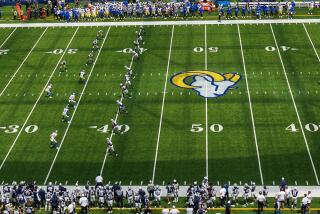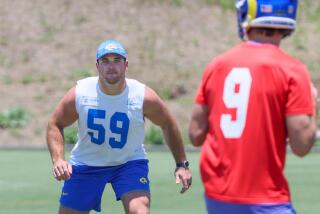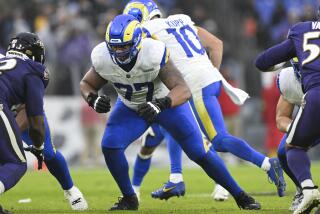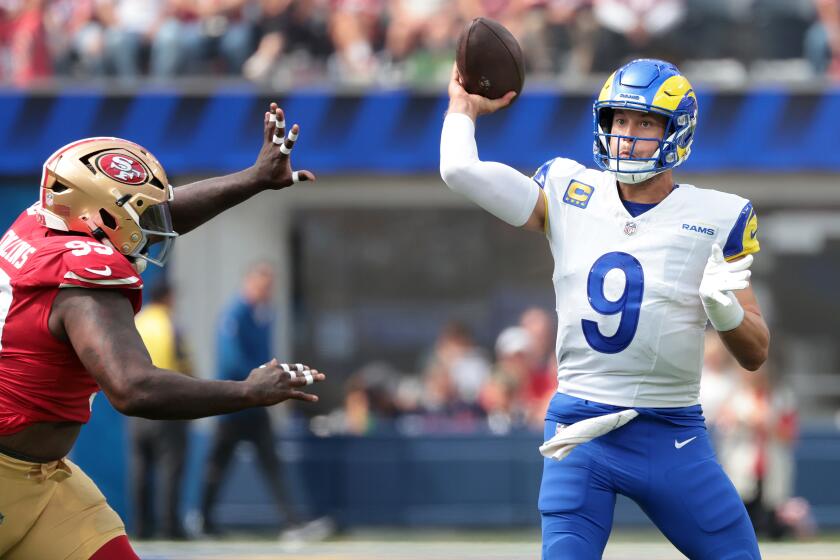In Ed Reed case, NFL plays more head games
An initial response to Ed Reed’s one-game suspension this week was a shrug. It didn’t really matter, anyway. His Baltimore Ravens are playing the San Diego Chargers on Sunday.
It got sillier as other reactions poured in.
Baltimore Sun columnist Mike Preston, a veteran NFL reporter and commentator, lost his grip a tad when he wrote that this was detrimental to Reed’s ability to take care of his family. The fine for the one-game suspension, were it to hold up, was hefty, no doubt. But the $423,529 Reed was to lose would still leave him with a remaining annual salary of $6,776,471.
Clearly, even with the price of junk food likely to increase with the departure of Hostess Twinkies, Reed would be still able to feed his kids.
Then, of course, the NFL ran a reverse. The suspension was dropped and the fine reduced to a paltry $50,000. Reed is a three-time offender of excessive helmet-to-helmet hits. This most recent opening of his checkbook brings his total in fines to $71,000 since 2010. Still, bills will be paid at the Reed household.
If you watched the hit Reed made on the Steelers’ Emmanuel Sanders, you were probably less horrified than usual. We are becoming immune to this because there is so much of it. This was a probation-and-pay-restitution hit, not a five-year-prison-term hit.
There was also the sarcastic view. Perhaps having seen the uniforms the Steelers were wearing — they looked like the result of a union between a rat and a bumblebee — Reed was reacting to ugliness, not the ball.
Still, upon less cynical thought, two things become apparent: Reed doesn’t totally get it and the NFL really has no idea how to fix it.
Reed is a 34-year-old defensive back. These players are bred to hunt and hit. If it isn’t in their DNA when they are drafted into the pros, they acquire it or they don’t survive. After the decision was changed by the NFL, Reed was tracked down by reporters, and he said, “C’mon, man. It’s a contact sport. I’m going for the ball.”
Then he went on to poke fun, at least indirectly, at the NFL’s desire to turn attempted murders into simple assaults.
“Maybe I’ll start my own flag football league,” Reed said.
It is understandable that Reed should embrace the present, that somebody who has been an All-Pro eight times and is still separating balls and shoulders from receivers would spend little time looking to the future. One wishes he had read a recent series of articles in the Washington Times about the aftermath of playing days in the NFL and the barrage of lawsuits that has triggered.
Especially poignant was one quote. Mike Bass, a former Washington Redskins defensive back, now 67, said, “You’re not so macho when you need help to go to the bathroom.”
No one can blame Reed for doing his job well. But one hopes that, when he’s 67, he doesn’t need help going to the bathroom.
One also hopes he is not spending his time in court, facing his former employers, as are about 4,000 of his aging peers. The current number of former NFL players suing the league, some separately and many more as part of joint action, is 3,962. The total number of plaintiffs in those cases, including family and others, is 5,450. Players suing range from an 84-year-old whose career began in 1949 to four who retired just last season.
The lawsuits generally say the same thing. The NFL knew of the sport’s dangers and didn’t warn or protect players enough. Then, when the ramifications — such as dementia, Alzheimer’s, ALS and useless knees and ankles and shoulders — came to pass, the NFL’s response was to lie, deny and hope the players died.
The NFL’s answer is usually some version of “safety has always been our concern and remains a high priority.”
There are reminders everywhere of that not being an adequate answer.
Three former prominent players — Ray Easterling, Dave Duerson and Junior Seau — commit suicide, and the NFL cannot halt the horror of them taking their own lives. Nor can it ease the perception when, in one week, three of its stars get taken out with concussions. Michael Vick, Alex Smith and Jay Cutler are sidelined and the legal briefs get thicker.
Preston said in his column that, in the Reed ruling, the “NFL crossed the line.”
Nope. It can’t find where the line is.
Ray Anderson, executive vice president of football operations for the NFL, decried Reed’s hit on Sanders as “missile-like.” Ted Cottrell, the NFL hearings officer who eventually reduced the penalties against Reed, called the hit on Sanders “egregious and warranting significant discipline.”
The cynical would look upon the NFL’s actions and stance as lip service, mere public relations, so that in years to come it can stand in front of the judge and be able to say, “Look, your Honor, this is what we have done the last few years.”
Preston was correct when he wrote: “The NFL is on a mission to prove it cares about players. We know they don’t, because they play Thursday night games.”
Yes, the short turnaround between games doesn’t give the players sufficient time to rest and heal, but in the end, money rules. And for the foreseeable future, so will the NFL in sports entertainment.
But will the league and its 32 richer-than-Rockefeller owners have the same swagger marching into courtroom after courtroom in the next decade?
More to Read
Go beyond the scoreboard
Get the latest on L.A.'s teams in the daily Sports Report newsletter.
You may occasionally receive promotional content from the Los Angeles Times.











